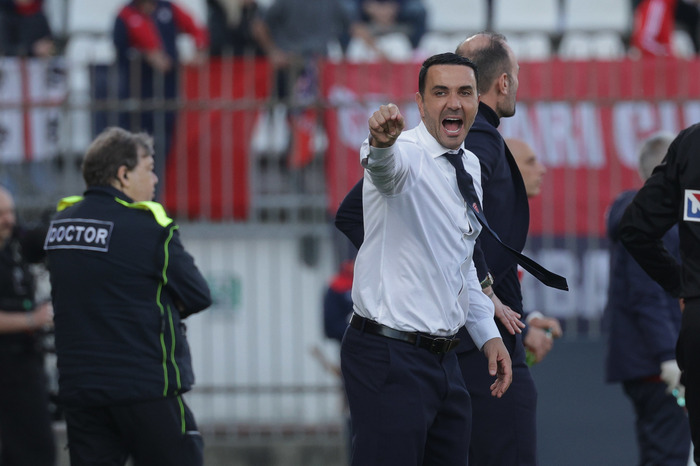Francis Kéré became known with Christoph Schlingensief's opera village in Africa.
The way his designs combine sophisticated planning with simple materials is now regarded as exemplary worldwide.
The architect has lived in Berlin since his studies.
In his office in the old building in Kreuzberg, the employees sit in a large room.
On the walls are certificates that identify Kéré as one of the 100 most influential Africans and honor his work.
For the interview, Kéré asks for self-designed chairs made from hardware store materials.
It's hard to imagine that he recently won a $100,000 prize after colleagues like Norman Foster, Zaha Hadid and Rem Koolhaas.
DER SPIEGEL:
Mr. Kéré, it's been seven weeks since you received the Pritzker Prize.
Does it already annoy you to be asked about it?
Francis Kéré:
Not at all.
I'm only slowly realizing what this means for the rest of my life.
This award opens doors for me, literally.
Suddenly I am spoken to, people listen to me in a completely different way.
People used to say I was naive.
Now I have received the most prestigious award in the world of architecture.
That is great satisfaction.
SPIEGEL:
Other award winners have built gigantic sports arenas or airports.
Would such large-scale projects also appeal to you?
Kere:
Why not?
We are already looking for a bigger office.
So far we have been working within a very manageable framework, our furniture is homemade and from Ikea.
We have people here from 13 countries.
That's a great mix.
I would like to know if it could be even bigger.
I'd be lying if I said it didn't appeal to me.
SPIEGEL:
After the educational and cultural institutions, you are now building and planning the parliaments of Burkina Faso and Benin.
With a project of this size, is social and ecological construction still possible?
Kéré:
That's a question I'm currently asking myself.
In the end, I don't think it depends on the size, but on the client.
Sustainable building costs, but often saves in the long term.
Of course, there are uncertainties when you look for local craftsmen and try out new things.
I'm a pragmatist.
I say that what I'm planning is not only good for the climate, but also supports the local economy.
You have to buy an air conditioner from China.
Passive cooling can be walled off.
Not infrequently, my solutions are also more beautiful.
I hate cheap tiles.
Before I use that, I put on colored clay walls.
If you really want to, you can also build on a larger scale under good conditions.
Enlarge image
The structures of Kéré are often built of mud reinforced with cement.
In this way, long-lasting and robust walls are created from the natural material
Photo: Tamara Eckhardt / DER SPIEGEL
SPIEGEL:
Sustainability and climate friendliness are now being promised almost everywhere.
At the same time, it is obvious that too little is still happening.
What does that mean for architecture?
Kéré:
We architects and urban planners are dependent on others.
Where politicians and companies only want sham solutions, there will be no sustainability.
Without question: There is too much greenwashing in our guild.
But that's not just up to us.
SPIEGEL:
There is a picture of you that shows you as a student testing the stability of a vaulted roof with locals in Burkina Faso.
This project became the primary school in Gando, which is now considered the cornerstone of your career.
How did this situation come about?
Kéré:
My father was a village elder.
But that meant less than you think.
He was good at growing tobacco and millet.
But did that make his son a good architect?
The distrust was huge at the time, I was a newbie myself.
So I decided to test everything with the people in the village beforehand.
So they saw that it had a hand and a foot.
To this day, I do it that way whenever possible.
Many designs quote things that people are familiar with, such as the »Arbre à Palabres«, the palaver tree where people traditionally meet.
That creates trust.
SPIEGEL:
You often build schools and cultural institutions.
How important was education in your own life?
Kere:
education is everything.
I've always had people who trusted me.
At first my father, who sent me away to learn to write.
Later the education system here in Germany.
Without Bafög I wouldn't be a Pritzker Prize winner today.
In the first years in Berlin I did my Abitur at night school.
On the side I had to earn money for my family in Gando.
I went to construction.
I was almost 30 when I started studying. The fact that I built my first project while still studying in my home country was not a deliberate move, it was simply necessary.
I had to give something back.
In West Africa, two-thirds are illiterate.
People learn by watching their parents.
But today this principle is reaching its limits.
Everyone moves to the cities, traditions are lost.
The own culture and simple,
efficient building are less valued.
Schools can change that.
Enlarge image
Kéré as a 3D printed model figure in his studio in Berlin.
The architect from Burkino Faso has brought building with simple materials to a world level
Photo: Tamara Eckhardt / DER SPIEGEL
SPIEGEL:
There is no longer a lack of interest in Africa. In addition to Western countries, China is now also promoting economic cooperation.
How do you experience this development?
Kéré:
Like most people, I would have said in the past: China is pursuing a neo-colonial foreign policy.
But is it really that simple?
The West has had a chance to help us for several centuries.
Even today, all of Africa is looking to Europe and the USA.
Everyone wants to be like that, every second villa is a copy of the White House.
But what has the West done?
In Burkina Faso, I saw for myself how pressured we were to privatize the water.
Do we want that?
The Chinese do a lot that you can also criticize.
They bring their own workers with them, they think in terms of large-scale projects.
Of course it's about selfishness.
But the Chinese policy of non-interference appears to Africans as a sign of respect.
I understand that their loans to poor countries are welcome.
SPIEGEL:
Excuse me, but doesn't that create even more dependency?
Kéré:
There are no friendships between countries, they say.
Western aid is also subject to conditions.
The criticism therefore seems dishonest to me.
We are still dealing with the consequences of our oppression.
There is terrorism, unemployment, population growth.
Having one more partner is not bad.
That's why I say yes, China is sometimes a blessing for Africa.
SPIEGEL:
Are there things the West could learn from African societies?
Kéré:
I have the feeling that the award gives me the right to be open now: maybe it's time for westerners to learn.
Especially when it comes to humility.
In Africa you can learn how to get by with fewer resources without exploiting other continents.
There is no air conditioning at my school in Gando.
The roof rises slightly, creating cooling through air circulation.
That's enough.
It's often small things.
If everyone built like the west, the earth would be broken tomorrow.
Enlarge image
Models for Coachella festival pavilions
Photo: Tamara Eckhardt / DER SPIEGEL
SPIEGEL:
In your work you repeatedly refer to the importance of community, the direct exchange between different people.
Kéré:
The pandemic has shown that we need such spaces.
The people in the cities want to come together, they long for it.
This is also important for relaxation.
But projects like this have a hard time.
SPIEGEL:
You once said that in Germany the sense of togetherness is only seen as a cost factor.
Kéré:
That's the truth.
We had competitions where we were praised from all sides for our social architecture.
The winner is then the one who planned fewer common areas.
I don't cry for anything.
But this thinking leads to a dead end.
Look at Stuttgart 21.
Why was there so much protest?
People didn't reject the project because they didn't like the architect.
They were against it because they were ignored and old trees were felled.
People no longer want white elephants, they want people to communicate with them.
When in doubt, architecture should be put to the vote.
SPIEGEL:
Aren't you afraid of rejection?
Kéré:
If a project isn't good, I'm out of luck.
In Mannheim we developed the master plan for an entire district, the Taylor barracks.
This site was isolated for 70 years.
I wanted us to build a large bridge over the autobahn there so that people could go through the district and into the forest.
Admittedly, my idea was naive at first.
I was told that you never win the competition that way.
And?
We won.
After long discussions comes the bridge.
Even if it looks different than initially planned.
I am sure that such ideas are worthwhile.
SPIEGEL:
You have been working in Berlin for 20 years, a city that once made a name for itself with Bruno Taut's housing estates and affordable housing.
Rents are skyrocketing today, and investor projects dominate architecturally.
Kere:
The situation in Berlin is unbearable.
A few years ago I could easily find apartments for employees, today even academics get nothing.
Where should all the people go who don't earn that much?
Something has to happen.
In the past, it was often industrialists who built modern settlements, just think of Siemensstadt.
Many of the buildings from this period aren't pretty, but they were built of brick, a local material.
Such ideas are lacking today.
Investors and politicians are too close, and at the same time there are too many rules.
We do not need new capital investments, but living space that brings people together.
I imagine houses in which younger people live more cheaply and are there for older neighbors.
We need more togetherness, we cannot delegate everything to the state.
This contribution is part of the Global Society project
Expand areaWhat is the Global Society project?
Under the title »Global Society«, reporters from
Asia, Africa, Latin America and Europe
report on injustices in a globalized world, socio-political challenges and sustainable development.
The reports, analyses, photo series, videos and podcasts appear in a separate section in SPIEGEL's international section.
The project is long-term and is supported by the Bill & Melinda Gates Foundation (BMGF).
A detailed FAQ with questions and answers about the project can be found here.
AreaWhat does the funding look like in concrete terms?open
The Bill & Melinda Gates Foundation (BMGF) has been supporting the project since 2019 for an initial period of three years with a total of around 2.3 million euros - around 760,000 euros per year.
In 2021, the project was extended by almost three and a half years until spring 2025 under the same conditions.
AreaIs the journalistic content independent of the foundation?open
Yes.
The editorial content is created without the influence of the Gates Foundation.
AreaDo other media also have similar projects?open
Yes.
With the support of the Gates Foundation, major European media outlets such as The Guardian and El País have set up similar sections on their news sites with Global Development and Planeta Futuro respectively.
Did SPIEGEL already have similar projects? open
In recent years, SPIEGEL has already implemented two projects with the European Journalism Center (EJC) and the support of the Bill & Melinda Gates Foundation: the "OverMorgen Expedition" on global sustainability goals and the journalistic refugee project "The New Arrivals ", within the framework of which several award-winning multimedia reports on the topics of migration and flight have been created.
Expand areaWhere can I find all publications on the Global Society?
The pieces can be found at SPIEGEL on the Global Society topic page.


/cloudfront-eu-central-1.images.arcpublishing.com/prisa/MI23BCFOBJATJDOOM7KTWZGRLU.jpg)






